'The Rings of Power' breaks the mold for TV. That isn't always a good thing.

It’s been nearly two years since The Lord of the Rings:The Rings of Power took viewers on a journey to the Second Age of Middle-earth in Season 1. On Aug. 29, the series returns where it last left off, as the first three episodes of Season 2 drop on Prime Video.
Based on The Appendices of The Lord of the Rings andThe Silmarillion by J.R.R. Tolkien, The Rings of Power takes place thousands of years before The Lord of the Rings trilogy. The story follows the rise of Sauron, the creation of the One Ring and the rebuilding of Middle-earth after a brutal war. In it, we see Dwarves and Elves at their height of glory, rather than in ruins as in Lord of the Rings.
The Rings of Power is the most expensive television show ever made. (Season 1 alone reportedly cost $465 million, while Jackson’s entire Lord of the Rings trilogy comparatively cost $360 million.)
The series broke many of the rules of TV, with two first-time showrunners and a never-before seen $1 billion budget. It also broke some hearts, as many Lord of the Rings fans criticized the series for taking too many creative liberties with the source material, including the scrambling of timelines, which created some canon headaches.

After spending years in development, fans’ expectations were high for the J.R.R. Tolkien epic ahead of its September 2022 series premiere. Prime Video shared that upon release, the series garnered over 25 million global viewers on its first day of streaming, making it the biggest premiere in the platform’s history at the time.
However, viewership didn’t appear to stick. According to the Hollywood Reporter, only 37 percent of U.S. viewers finished watching Season 1, while 45 percent of customers overseas completed it. Those who did watch the eight episodes of the first season gave it a 38% on Rotten Tomatoes.
The series was also plagued with accusations of “review bombing” — that is, fans writing scathing reviews without having seen a single episode, all in the hopes of tanking the show.
“We all saw it coming, there were no surprises. Having insight into our global audience, we also have insight into the darker sides of how people can manipulate reviews and have other points of view that we wouldn’t support,” Jennifer Salke, head of Amazon Studios and MGM Studios, told the Hollywood Reporter.

According to Amazon, there was an effort to attack Rings of Power for casting actors of color and depicting strong female characters. Prime Video turned off its reviews and suspended ratings for 72 hours following the Season 1 premiere.
However, many fans argued that the reviews were genuine and that the show was simply poorly written, badly designed and deviated too often from major Tolkien lore.
“What if Rings of Power isn’t getting ‘review bombed’? What if it just isn’t good?” asked one Reddit user. “One of the prevailing narratives is that [Rings of Power] is getting review bombed by racist and sexist trolls. If this is the case, why isn’t House of the Dragon getting the same treatment?” (Season 1 of HBO’s House of the Dragon was released Aug. 21, 2022, less than two weeks before the Prime Video series.)
“Where did all that money go?” another redditor asked. “Clearly not to paying good writers, hiring big stars, making really detailed, handcrafted sets and costumes where every piece of mail was hand-forged, or refining CGI to Avatar-like levels. Who got it all, in the end? Was this whole show just a giant money-laundering scheme?”
“How two people with almost no experience end up being showrunners for one of the most lauded properties is beyond me,” one commenter wrote on Rotten Tomatoes.

For showrunners Patrick McKay and John D. Payne, The Rings of Power marked their very first foray into making television. Together, the two have written for almost 25 years, collaborating on J.J. Abrams’s Star Trek Beyond and Walt Disney Studios’ Jungle Cruise, among other projects.
“We had reached a point — we’d been writing movies for 10 years that should have gotten made,” McKay told the Hollywood Reporter. “Movies where the director was right, the cast was right, the script was right, the title was right and it was a big IP — and it still wasn’t happening. So [we thought] maybe we should try this TV thing.”

When their agents asked what their dream project would be, the duo replied, “TheLord of the Rings.” According to the first-time showrunners, Rings was a passion project, one they threw everything they had into.
“Some of what’s been hardest to hear is the cynical point of view that this is a cash grab,” McKay told the outlet. “It’s like, oh my God, the opposite. This is the most earnest production. This is not a paycheck job for anybody. This is a labor of love.”
Salke echoed the showrunners’ sentiments. “They had such a deep connection to the material that was there from the beginning. There was no education you could do for that; it was their natural organic interest.”
But many fans argued that Season 1 of Rings was a total departure from its source material, saying it could hardly be identified as the same story.
“One word, disastrous. … Character’s personalities changed, people’s cultures changed, convoluted writing, objects’ origins changed, timelines messed up,” wrote Rotten Tomatoes user Ruth N., who gave Season 1 a 0.5 star rating. “If you’re going to change the lore, why not create your own? … [Don’t] use someone’s already constructed world and try to re-invent it. It’s so frustrating.”
Others took issue with the writing beyond deviating from Tolkien lore.
“People who read the books are off-put because of the canon violations. People who don’t read the books are off-put because it’s not well written and boring,” wrote one redditor in a Lord of the Rings subreddit.
“The story is not built around characters, how they interact, or the choices they make. There is no good guy. There is no bad guy. There's no one to root for and no one to hope for. Each character is just a contradictory grab bag of reactions,” another Reddit user wrote.

Despite all the negative criticism of Season 1, fans seem eager to tune in to Season 2 — if only to see whether showrunners took note of their feedback.
“I am still excited for season two. I loved it, for the most part. Sure there were some things I didn’t care for that much … but overall I loved it,” wrote one redditor. “I guess there really are different types of Tolkien fans. Like those who want a repeat of the films and action, action, action. I enjoy the quieter moments. … I am glad Amazon is doing the show. I think it can only get better from here on out.”
The showrunners themselves are aware of the fandom — and the negative criticism Season 1 has received.
“It’s gratifying to have such a fanbase that we have in fans of Middle-earth and fans of Tolkien,” Payne told the Gamer. “There’s a lot of different thoughts and opinions and feelings that come whenever you’re working with such a big property. We see it all as a token of people’s love for Tolkien. And so we appreciate that people are so engaged with the material.”
“Positive or negative, it’s all background noise to a certain extent,” McKay added.
The first three episodes of The Lord of the Rings: The Rings of Power start streaming Aug. 29 on Prime Video.


